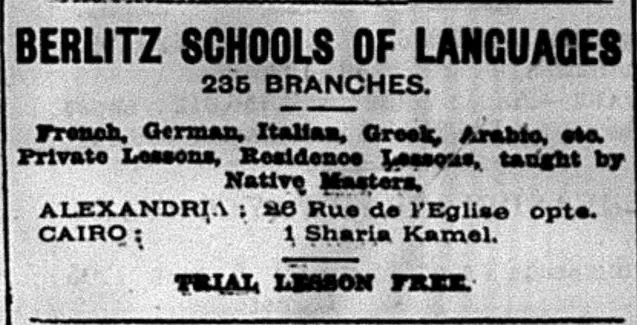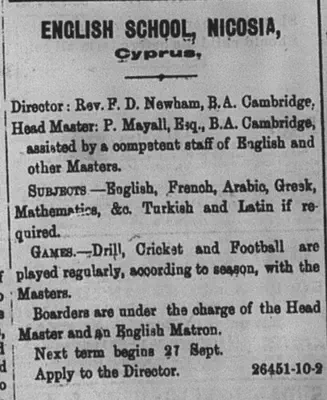Higher Learning through the Newspaper
 Week of September 18 to 23, nearly every issue
Week of September 18 to 23, nearly every issueWithin every issue throughout my week I continually saw two advertisements that stood out to me, an advertisement for a school of Language and an advertisement for an “English School”. Seeing education opportunities from the early 1900s is fascinating to me as it is during the century that public education became a cornerstone in developed nations.
First are the Berlitz Schools of Languages, typically found under the “Cheap Pre-paid advertisement” column on Page 5’s. It sounded familiar to me, and after doing a brief amount of searching, this is a education company/institution that has persisted since 1878 all the way until to the present day, hailing from the state of Rhode Island. In 1905 however, students in Egypt would only be able to attend the locations present in Alexandria and Cairo, unlike now, as the Berlitz Corporation offers full courses online.
The next advert regarding education that intrigued me was the “English School, Nicosia” advertisement. Offering a range of subjects, from Turkish to Mathematics, this school seemed a little more similar to institutions of the modern day. Also, this school seemed to have a sessions of Cricket and Football to be played with the instructors, which struck me as something related to more modern school systems. After a small amount of searching, it appears that this school persisted to the modern day just as the Berlitz program did. Besides being one of the more notable institutions of higher learning in the Middle East, it is also an modern example of social change. For over two decades following the Turkish invasion of Cyprus, Turkish students were not admitted into the school, becoming a predominantly Greek Cypriot institution. However in 2003, the English School opened it’s admission to Turkish Cypriots and it’s general admission numbers have only grown exponentially since then.

Even though during this time secondary education wasn’t seen as something that the whole of society deserved, it is still worth looking into these smaller institutions because it gives people a clearer understanding of how a system of education grows as more people become involved in it, and the social changes that occur through a better educated populace.